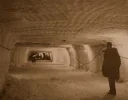Tähän Saksan ydärijuttuun liittyen: Euroopan Unionille omat ydärit Ranskalta?
https://www.nytimes.com/2017/03/06/world/europe/european-union-nuclear-weapons.html?_r=2&referer
Under such a plan,
France’s arsenal would be repurposed to protect the rest of Europe and would be put under a common European command, funding plan, defense doctrine, or some combination of the three. It would be enacted only if the Continent could no longer count on American protection.
Though no new countries would join the nuclear club under this scheme, it would amount to an unprecedented escalation in Europe’s collective military power and a drastic break with American leadership.
Analysts say that the talk, even if it never translates into action, demonstrates the growing sense in Europe that drastic steps may be necessary to protect the postwar order in the era of a Trump presidency, a resurgent Russia and the possibility of an alignment between the two.
Continue reading the main story
Even proponents, who remain a minority, acknowledge enormous hurdles. But discussion of a so-called “Eurodeterrent” has entered the mainstream — particularly in
Germany, a country that would be central to any plan but where antinuclear sentiment is widespread.
Jana Puglierin of the German Council on Foreign Relations said that a handful of senior European officials had “for sure triggered a public debate about this, taking place in newspapers and journals, radio interviews and TV documentaries.”
She added: “That in itself is remarkable. I am indeed very astonished that we discuss this at all.”
A Nuclear ‘Plan B’
Jaroslaw Kaczynski, Poland’s former prime minister and now the head of its ruling party, provided the highest-level call for a European Union nuclear program in a
February interview with a German newspaper.
But the most important support has come from Roderich Kiesewetter, a lawmaker and foreign policy spokesman with Germany’s ruling party, who gave the nuclear option increased credibility by raising it shortly after President Trump’s election.
In an interview in the German Bundestag, Mr. Kiesewetter, a former colonel who served in Afghanistan, calibrated his language carefully, providing just enough detail to demonstrate the option’s seriousness without offering too much and risking an outcry from German voters or encouraging the American withdrawal he is hoping to avoid.
“My idea is to build on the existing weapons in Great Britain and France,” he said, but acknowledged that Britain’s decision to leave the European Union could preclude its participation.
The United States bases dozens of nuclear warheads in Germany, Italy, Belgium and the Netherlands as both a quick-reaction force and a symbol of its guarantee to protect the Continent. Mr. Kiesewetter said his plan would provide a replacement or parallel program.
This would require, he said, four ingredients: a French pledge to commit its weapons to a common European defense, German financing to demonstrate the program’s collective nature, a joint command and a plan to place French warheads in other European countries.
The number of warheads in Europe would not increase under this plan, and could even decrease if the United States withdraws.
“It’s not a question of numbers,” Mr. Kiesewetter said. “The reassurance and deterrence comes from the existence of the weapons and their deployability.”
He envisioned a program designed to deter nuclear as well as conventional threats — a clear nod to Russia’s military superiority.
This would require a doctrine, he said, allowing Europe to introduce nuclear weapons to a non-nuclear conflict. He compared it to the Israeli program, which is believed to allow for a nuclear strike against an overwhelming conventional attack.
“These are political weapons. Their use must be unpredictable,” he said. Smaller nuclear powers often maintain vague doctrines to deter more powerful adversaries.
The goal, he said, would be to maintain Europe’s defense, seen as crucial for its internal unity, as well as its international diplomatic standing.
German lawmakers across the political spectrum worry that Mr. Trump could strike a grand bargain with Russia that excludes Europe, a potential first step toward Washington and Moscow dictating Europe’s future. Mr. Kiesewetter believes a European nuclear program would allow Europe to preserve its autonomy.
‘A Political Minefield’
Mostly, Mr. Kiesewetter said he hoped to spur Mr. Trump to end doubts over American security commitments to Europe, rendering unnecessary the nuclear “Plan B.”
For now, Mr. Kiesewetter’s intention is merely to “trigger a debate” over addressing “this silent, gigantic problem.”
It has worked. A small but growing contingent of German analysts and commentators
have endorsed versions of a
European nuclear program.
Mr. Kiesewetter said he had heard interest from officials in the Polish and Hungarian governments, at
NATO headquarters in Brussels and within relevant German ministries, though he would not say which.
But any European nuclear program would face enormous hurdles.
“The public is totally opposed,” Ms. Puglierin said, referring to German antinuclear sentiment, which has at times culminated in nationwide protests against the weapons.
In practical terms, the plan would change the flag on Europe’s nuclear deterrent from that of the United States to that of France. But this would risk making an American exit from Europe more permanent.
Oliver Thränert, a German analyst with the Switzerland-based Center for Security Studies,
warned in a white paper that any plan “would not only be expensive, but also a political minefield full of undesirable potential political consequences.”
The biggest challenge may be who controls the French arsenal and where it is based.
The United States currently shares warheads with allies like Germany, whose militaries are equipped to deliver the weapons, granting the program credibility as a Pan-European defense.
But France has shown no willingness to share its weapons, much less put them under a joint European command. If Paris maintains final say over their use, this might cause an adversary to doubt whether France would really initiate a nuclear conflict to protect, say, Estonia.
France and ‘a Special Responsibility’
These sorts of problems are why Bruno Tertrais of the Foundation for Strategic Research in Paris said, “In other times I would have told you don’t bother, there’s no story here.”
Similar proposals have been floated before, including by the French government, and always rejected as politically risky and strategically unnecessary. But, he said, that calculus appears to have a potential to change with Mr. Trump.
“There’s already a bit more interest in Berlin and in Paris,” Mr. Tertrais said, though he emphasized that this talk would become action only if there were “a serious loss of trust in the U.S. umbrella.”
But a joint European command or funding scheme would most likely be impossible, he warned. The French government would insist on maintaining “the final decision to use nuclear weapons.”
That is also United States policy in Europe, which is why Mr. Tertrais believes a more workable plan would be for France to reproduce American-style practices of basing its warheads abroad, while keeping them under French control.
While most French warheads are lodged on submarines, a few dozen are fitted to air-launched cruise missiles that could be housed in, for example, German airfields. These are smaller, shorter-range tactical weapons — exactly the American capability that Europe most fears losing.
French policy already allows for, though does not require, using nuclear weapons in defense of an ally.
With Britain’s exit from the European Union, “the French might feel they have a special responsibility” as Europe’s sole nuclear power.
Vipin Narang, a Massachusetts Institute of Technology professor who studies regional nuclear powers, was initially skeptical but came to see such a plan as both technically and politically feasible.
For France, he said, “it extends their frontier,” making it likelier that a nuclear conflict would be fought far from French soil. For Germany and other European states, it would “increase the credibility of the forward deployment against Russian aggression.”
An Insurance Policy
Some observers believe that official shows of support are intended only to pressure Mr. Trump into maintaining the status quo, which Mr. Kiesewetter emphasized is his preferred outcome.
But Mr. Narang said that, regardless of intentions, there is a blurry line between mere signaling and actually pursuing a fallback nuclear option.
Nuclear scholars call this “insurance hedging,” in which a protectee comes to doubt its protector and responds by taking steps toward, but not actually completing, its own nuclear program. This is meant to goad the protector into staying, and to prepare in case it doesn’t.
Japan, for instance, has quietly developed
latent capabilities that are sometimes figuratively described as a “screwdriver’s turn” away from a bomb.
Because Europe’s primary challenges are political rather than technical — France already possesses the warheads — sparking public discussion and exploring options makes those challenges more surmountable and the option more real.
“In order for it to be credible there has to be some sort of workable option,” Mr. Narang said.
‘I Never Thought We Would See This Again’
Mr. Kiesewetter hopes the United States will come around. He puts particular faith in Jim Mattis, the defense secretary, whom he met in Afghanistan and Brussels while both were military officers.
But Mr. Mattis has
echoed Mr. Trump’s warnings that the United States could lessen its support for Europe, saying in a recent speech in Brussels, “I owe it to you to give you clarity on the political reality in the United States.”
If Europeans grew more serious about a nuclear program, Mr. Tertrais said, “you would not necessarily see it.” Negotiations would most likely remain secret for fear of giving Mr. Trump an excuse to withdraw — or of triggering a reaction from Russia.
Mr. Narang said he was reeling from the seriousness of the discussion, the first since a failed and
now-forgotten effort in the 1950s for French-German-Italian nuclear cooperation.
“I never thought we would see this again. I never thought there would actually be this concern,” he said. But, he added, “You can see where the debate is surfacing from. There is a logic to it.”




